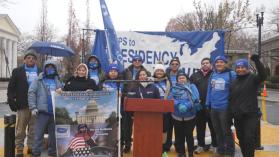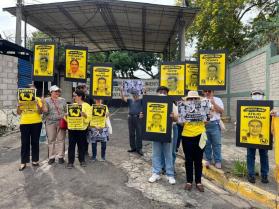New Rules for Voting Abroad, As Explained by FMLN Legislator
On August 28, Salvadoran legislator Anabel Belloso, from the Farabundo Martí National Liberation Front (FMLN), held an online information session for the Salvadoran diaspora to share the latest information about how voting outside of El Salvador will be governed for the upcoming presidential and legislative elections on February 4, 2023.
While President Bukele’s Nuevas Ideas government is touting their election law, Special Law for the Exercise of Suffrage Abroad, passed in October of last year, as a long-delayed enfranchisement for the Salvadoran diaspora, voting from outside of the country has been possible for presidential elections since 2014. What is newly permitted under the October legislation is participation from abroad in the Legislative Assembly election.
Voting abroad is set to happen electronically with two options: in-person electronic voting at consulates and other diplomatic sites (which have not been specified) on Election Day or online voting from personal computers in the weeks and days before, both a first for any Salvadoran election. Online voting will be possible from January 6, 2024 until the day of the election, February 4, 2024. In-person electronic voting will take place at 81 voting centers in 30 different countries, with the majority being in the United States.
However, according to Belloso, the details of the process are behind schedule as stipulated in the law, and leaders of opposition parties have expressed concern about the potential for fraud in the new systems. Salvadorans living outside of the country will have until November 5 to register to vote in the 2024 elections. They can review their registration and voting center on the Supreme Electoral Tribunal (TSE) web site. All votes cast using a passport or an identification card (DUIs) with addresses outside of El Salvador will be counted as votes towards the San Salvador legislative delegation, a clause included in the new voter law. Voters will have until November 5 to change the address on their DUI or obtain a new one if they want to vote in an electoral district outside of San Salvador.
The move to count more votes from abroad towards San Salvador’s legislative seats is seen by opposition leaders as an electoral tactic, aimed at disproportionately influencing the vote in the capital, where legislative seats are most densely located, and where the highest number of opposition legislators were elected in the previous legislative election.
Opposition political parties also expressed concern about the security of the process, specifically with regards to IDs and electronic voting. Salvadorans will, for the first time, be able to cast votes with expired DUIs or with passports. Both of these broaden the possibility for voter fraud, as one person can have multiple valid forms of identification eligible for voting, and training to verify the authenticity of passports for voting purposes will be needed.
Electronic and online voting present their own concerns. In El Salvador, votes are set to be cast and counted as they have in past elections: by paper ballot with a vote count done by hand, and with results verified by multiple parties before each voting station submits them electronically to the Supreme Electoral Tribunal (TSE). While rolling out electronic voting on a large scale without years of testing is unconventional in and of itself, several other concerns have arisen with regards to the company contracted to carry it out. A Spanish company, Indra, was awarded the contract despite having offered the most expensive bid, with the least amount of detail. The bid also violated the existing government contracting law when it was increased while the process was already underway. Additionally, the company has not offered a plan for preventing fraud or guaranteeing the veracity of votes.
Belloso also stressed her party’s opposition to the Supreme Electoral Tribunal’s (TSE) August announcement about the composition of the electoral oversight boards that will be installed in each country where Salvadorans will be voting abroad, the Voting Abroad Electoral Board (JELVEX). According to the 2022 law, this three member board, charged with verifying the authenticity of votes and with the power to dispute irregular votes, will be made up of representatives of the three parties that received the most votes in the previous election. Although the FMLN received the third highest vote count in the 2021 elections, after Bukele’s Nuevas Ideas party and the traditional right-wing Nationalist Republican Alliance (ARENA), the TSE instead awarded the third seat to GANA, which ran in coalition with Nuevas Ideas. According to Belloso, this move clearly intends to violate the FMLN’s right to participate in the electoral oversight mechanisms as an opposition political party. Additionally, it is an indication of Bukele’s influence over the TSE, El Salvador’s highest electoral authority, a factor that will likely lead to the TSE accepting Bukele’s candidacy in the 2024 election, despite the fact that remaining in office for a consecutive presidential term is unconstitutional.
These new details about the voting process for Salvadorans abroad come amidst broader changes to the electoral system that have recently been strongly denounced by Salvadoran popular social movement groups. In recent months, president Nayib Bukele formally announced his bid for re-election, despite multiple prohibitions in the Constitution. His party’s super-majority in the Assembly more recently passed legislation to reduce the number of legislative seats by almost 30% and the number of municipalities by over 80%. The reforms also changed the way votes are counted, making it harder for minority parties to gain seats in the legislature. With campaign season and elections right around the corner, Bukele’s unconstitutional re-election bid and attacks against the electoral process were a central call to action for this year’s massive street protests on September 15, El Salvador’s Independence Day.

 "I am a CISPES supporter because continuing to fight for social justice and a more people-centered country means continuing the dream and sacrifice of thousands of my fellow Salvadorans who died for that vision.” - Padre Carlos, New York City
"I am a CISPES supporter because continuing to fight for social justice and a more people-centered country means continuing the dream and sacrifice of thousands of my fellow Salvadorans who died for that vision.” - Padre Carlos, New York City

